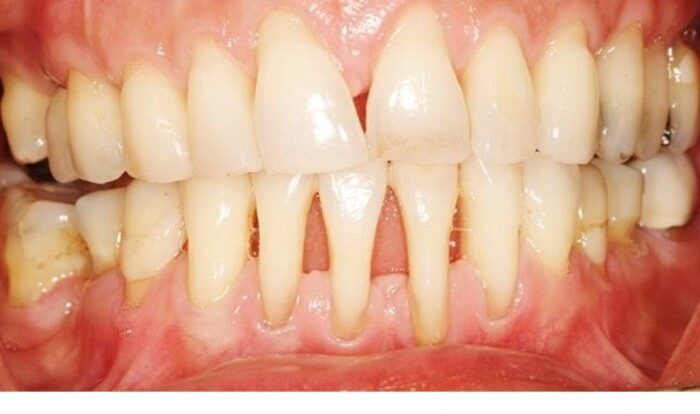
Yo, check it! Got gum disease but can’t hit up the dentist? Don’t trip, we got your back. Let’s dive into the ultimate guide on how to cure gum disease without a dentist. Get ready to ditch the pain and flash that healthy smile, boo!
From natural remedies that’ll make your gums sing to lifestyle changes that’ll rock their world, we’re spilling all the tea on keeping your gums happy and healthy. Let’s get this party started!
Home Remedies

Yo, check it, if you’re tripping over gum disease but can’t hit up the dentist, don’t stress. There’s a whole squad of home remedies that can help you out. Let’s dive in, homie.
Saltwater Rinses
This one’s a classic for a reason. Salt is a natural disinfectant, so swishing it around your mouth can help kill bacteria and reduce inflammation. Just mix a teaspoon of salt in a cup of warm water and rinse for a minute or two.
Do this a few times a day for best results.
Tea Tree Oil, How to cure gum disease without a dentist
Tea tree oil is a natural antibacterial and antifungal, making it a great choice for fighting gum disease. Add a few drops to a cup of water and rinse your mouth for about 30 seconds. You can also dab a little bit of tea tree oil directly onto your gums with a cotton swab.
Clove Oil
Clove oil is another natural antibacterial and anti-inflammatory. It can help relieve pain and swelling in the gums. Mix a few drops of clove oil with a teaspoon of coconut oil and apply it to your gums. Leave it on for a few minutes before rinsing your mouth with warm water.
Yo, peeps! If your gums are actin’ up, don’t trip, ’cause there’s a dope way to cure gum disease without a dentist. Check it out at how to cure gum disease without a dentist . It’s like a DIY gum saver, straight up!
Turmeric
Turmeric is a spice that has powerful antibacterial and anti-inflammatory properties. You can make a turmeric paste by mixing a teaspoon of turmeric powder with a little bit of water. Apply the paste to your gums and leave it on for a few minutes before rinsing your mouth.
Cinnamon
Cinnamon is another spice that can help fight gum disease. It has antibacterial and antioxidant properties. Mix a teaspoon of cinnamon powder with a little bit of honey and apply it to your gums. Leave it on for a few minutes before rinsing your mouth.
Oregano
Oregano is a herb that has antibacterial and antifungal properties. You can make an oregano tea by steeping a teaspoon of dried oregano in a cup of hot water. Let it cool and then rinse your mouth with it.
Yo, you think you need a dentist to fix your busted gums? Think again! There’s a whole bunch of ways to cure gum disease without a dentist . You can try salt water rinses, tea tree oil, or even just brushing your teeth more often.
Check it out and get your gums back in tip-top shape without breaking the bank!
Lifestyle Modifications

Maintaining a healthy lifestyle is key in preventing and treating gum disease. Simple changes in your daily routine can make a big difference in the health of your gums.
Oral Hygiene Practices
Brush your teeth twice a day with a soft-bristled toothbrush and fluoride toothpaste. Flossing once a day is also essential to remove plaque and bacteria from between your teeth. If you have difficulty flossing, there are many other interdental cleaning tools available, such as water flossers or interdental brushes.
Dietary Changes
Sugary foods and drinks feed the bacteria that cause gum disease. Reducing your intake of these foods can help prevent the growth of bacteria and keep your gums healthy. Vitamin C is important for gum health because it helps to strengthen the connective tissue that holds your teeth in place.
Eating plenty of fruits and vegetables that are rich in vitamin C can help support gum health.
Stress Management and Smoking
Stress can contribute to gum disease by weakening your immune system. Finding healthy ways to manage stress, such as exercise, yoga, or meditation, can help improve your overall health and reduce your risk of gum disease. Smoking is a major risk factor for gum disease.
Quitting smoking is one of the best things you can do for your overall health, including the health of your gums.
Over-the-Counter Treatments
If you’re dealing with gum disease but don’t have the time or money for a dentist, over-the-counter treatments can be a lifesaver. These products are designed to help reduce inflammation, kill bacteria, and promote healing.
Types of Over-the-Counter Treatments
There are three main types of over-the-counter treatments for gum disease: mouthwashes, gels, and rinses.
- Mouthwashesare the most common type of over-the-counter treatment for gum disease. They contain a variety of ingredients that can help to reduce inflammation, kill bacteria, and promote healing.
- Gelsare similar to mouthwashes, but they are thicker and can be applied directly to the gums. This can help to deliver a higher concentration of active ingredients to the affected area.
- Rinsesare a good option for people who have sensitive gums. They are less likely to cause irritation than mouthwashes or gels.
Choosing the Most Effective Products
When choosing an over-the-counter treatment for gum disease, it is important to look for products that contain active ingredients that have been shown to be effective against the bacteria that cause gum disease. These ingredients include:
- Chlorhexidine
- Cetylpyridinium chloride
- Triclosan
- Hydrogen peroxide
The concentration of the active ingredient is also important. Higher concentrations are more effective, but they can also be more irritating. It is important to start with a lower concentration and gradually increase it as needed.
Potential Side Effects and Precautions
Over-the-counter treatments for gum disease are generally safe, but they can cause side effects. These side effects can include:
- Irritation
- Dry mouth
- Tooth discoloration
- Altered taste
If you experience any side effects from an over-the-counter treatment for gum disease, stop using the product and talk to your doctor or dentist.
Prevention Strategies: How To Cure Gum Disease Without A Dentist
Prevention is key when it comes to gum disease. Here are some ways to keep your gums healthy:
Regular dental checkups and cleanings are crucial. Your dentist can remove plaque and tartar that you can’t reach with brushing and flossing. They can also check for signs of gum disease and treat it early on.
Professional Fluoride Treatments and Sealants
Fluoride treatments strengthen your teeth and make them more resistant to cavities. Sealants are thin coatings that are applied to the chewing surfaces of your teeth to protect them from decay. Both treatments can help prevent gum disease by keeping your teeth healthy.
Dental Probiotics
Dental probiotics are live bacteria that can help maintain a healthy balance of bacteria in your mouth. This can help prevent gum disease by reducing inflammation and fighting off harmful bacteria.
Yo, if you’re lowkey struggling with gum disease, don’t trip. There’s a dope link I found that’s got the scoop on how to cure it without even hitting up a dentist. Check it: how to cure gum disease without a dentist . You got this, fam.
Trust me, it’s the bomb.
Surgical Options

Surgical options are considered for severe gum disease that does not respond to non-surgical treatments. These procedures aim to remove diseased tissue, restore healthy gum tissue, and prevent further bone loss.
Yo, peeps! Suffering from gum disease? Don’t fret, ’cause you can ditch the dentist and heal that mess yourself. Check this out: How to Cure Gum Disease Without a Dentist . It’s got all the sick tips and tricks to get your gums back in tip-top shape.
From natural remedies to easy-to-follow instructions, this guide’s got you covered. So, what are you waiting for? Get that gum game strong without breaking the bank!
Scaling and Root Planing
Scaling and root planing is a deep cleaning procedure that removes tartar and bacteria from the root surfaces of the teeth. It involves using specialized instruments to scrape away the tartar and smooth the root surfaces, promoting healing and reducing inflammation.
Flap Surgery
Flap surgery is performed when the gum tissue has receded significantly, exposing the roots of the teeth. During this procedure, the gum tissue is lifted back to expose the roots, which are then cleaned and treated. The gum tissue is then repositioned and sutured in place, covering the exposed roots and promoting healing.
Bone Grafting
Bone grafting is necessary when the bone supporting the teeth has been damaged by gum disease. The procedure involves placing bone material from another part of the body or a synthetic bone substitute into the affected area. The bone graft helps to regenerate the lost bone and provide support for the teeth.
Post-Operative Care and RecoveryAfter surgical treatment for gum disease, it is essential to follow post-operative instructions carefully to ensure proper healing and prevent complications. These instructions may include:
- Restricting physical activity
- Avoiding hard or chewy foods
- Rinsing with an antiseptic mouthwash
- Taking prescribed antibiotics or pain relievers
- Scheduling regular follow-up appointments for monitoring and further treatment if necessary
Ultimate Conclusion
So, there you have it, folks! Whether you’re into natural remedies or over-the-counter treatments, there are plenty of ways to give gum disease the boot without a dentist. Remember, prevention is key, so don’t skip those dental checkups and cleanings.
Keep that smile bright and your gums healthy, and you’ll be flashing that pearly white grin for days!
Detailed FAQs
Can I cure gum disease permanently without a dentist?
While home remedies and lifestyle changes can help manage gum disease, it’s important to see a dentist for a proper diagnosis and treatment plan. Severe cases may require professional intervention.
Is it safe to use essential oils for gum disease?
Some essential oils, like tea tree oil and clove oil, have antibacterial properties. However, it’s crucial to dilute them properly and use them cautiously, as they can be irritating to the gums.
How often should I brush and floss my teeth?
Brush your teeth twice a day and floss once a day to maintain good oral hygiene and prevent gum disease.





